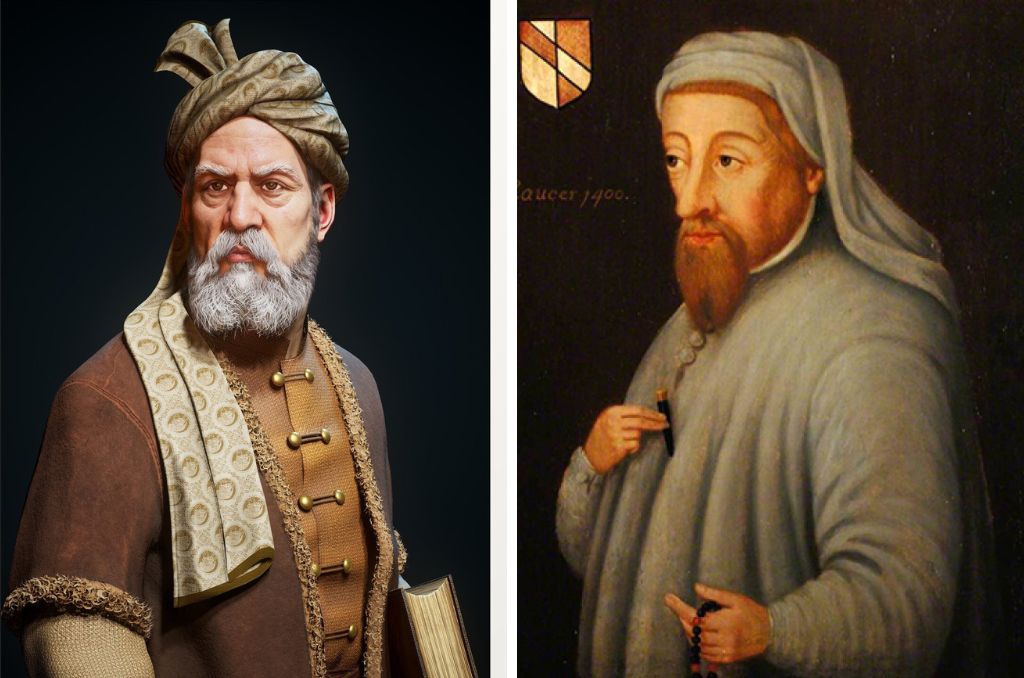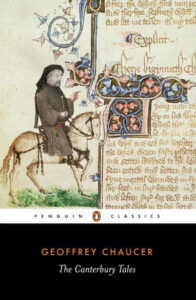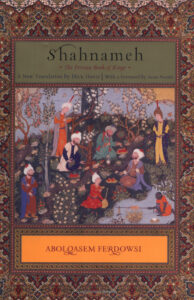
Geoffrey Chaucer’s statue stands in the middle of the main road in Canterbury, a small town close to London. Chaucer’s grandiose gesture, that of offering a book to a passerby, caught my eye.
Nearby the statue I found a barcode scan on the ground. Zooming in, I learned that the book in Geoffrey Chaucer’s hand is The Canterbury Tales, a Magnum Opus collection of thirty-four stories that ran to over 17,000 lines written in Middle English.
The tales are mostly written in verse and some prose. They are presented as part of a storytelling contest by a group of 30 pilgrims (29 pilgrims plus Chaucer himself) as they travel together from and to Canterbury to visit the shrine of Saint Thomas Becket at Canterbury Cathedral in 1387. The prize for the contest was a free meal at the Tabard Inn at Southwark on their return.
 Geoffrey Chaucer was named the “father of the English language,” or alternatively the “father of English poetry” for writing the first English book. Before The Canterbury Tales, books were in Latin, Italian, or French. Chaucer’s contribution to English literature earned him a place at the Poets’ Corner in Westminster Abbey. He was the first poet to be buried there.
Geoffrey Chaucer was named the “father of the English language,” or alternatively the “father of English poetry” for writing the first English book. Before The Canterbury Tales, books were in Latin, Italian, or French. Chaucer’s contribution to English literature earned him a place at the Poets’ Corner in Westminster Abbey. He was the first poet to be buried there.
I clumsily passed by his grave at Westminster Abbey, never noticing him. Little did I know I would read about him, and his contribution to the English language, a few days later.
Geoffrey Chaucer’s contribution to English literature is what Abul-Qasem Ferdowsi’s contribution is to Persian literature. Like Chaucer, Ferdowsi is called the “father of Persian language.”
Ferdowsi is a legendary Persian poet and the author of Shahnameh or Book of Kings. Shahnameh is one of the world’s longest epic poems created by a single poet between 977 and 1010 CE. Ferdowsi is celebrated as one of the most influential figures both in Persian literature and world literature.
If Chaucer tells stories of common people, Ferdowsi tells stories of kings and queens.
The Persian empire lost wars against Muslim armies and collapsed in 334 BCE. Persians were at the brink of losing their cultural heritage under the heavy influence of Arab language and culture.
Ferdowsi revived the Persian language through 60,000 lines of poems in Shahnameh. There are less than 200 Arabic words in the Book of Kings. Shahnameh is cited as a crucial component in the persistence of the Persian language that allowed the tongue to remain codified and intact.
Iranian scholars believe that the Persian language couldn’t survive without Ferdowsi’s Shahnameh.
It’s been a while since I visited Ferdowsi’s tomb in Tus, a small town in Khorasan province, where Ferdowsi lived and died. However, my visit to Canterbury is still fresh in my mind.
 During my stroll at Canterbury, I detected The Chaucer Bookstore (www.chaucer-bookshop.co.uk), a cozy second-hand bookstore at 7 Beer Cart Lane. I visited the bookstore on the second day of my stay. The light brown three-story building smelled of paper and ink. Inside, were the sounds of silence and tranquility. On the second floor, I saw two fluffy Persian cats roaming around the floor. I wondered about Chaucer and Ferdowsi’s connection with both Canterbury and Persian cats.
During my stroll at Canterbury, I detected The Chaucer Bookstore (www.chaucer-bookshop.co.uk), a cozy second-hand bookstore at 7 Beer Cart Lane. I visited the bookstore on the second day of my stay. The light brown three-story building smelled of paper and ink. Inside, were the sounds of silence and tranquility. On the second floor, I saw two fluffy Persian cats roaming around the floor. I wondered about Chaucer and Ferdowsi’s connection with both Canterbury and Persian cats.
I picked up a few books to check out. I was waiting for the cashier, who I thought might be the owner of the bookshop, to finish her phone conversation. I turned to my left to only glance at The Canterbury Tales on the long bookshelf. I could easily detect the “penguin” figure in the middle of the book cover.
“This edition just came out,” the woman said while hanging up her phone. “We just received our first batch yesterday,” she said with her delicious British accent. And of course, I bought one.
I’m still reading The Canterbury Tales. What I can report here is that some tales are long. The “Knight’s Tale,” the first tale in the book, is about 30 pages, while the “Parson’s Tale,” which is more a sermon on the seven deadly sins than a real tale, is about 50 pages.
In his story, the Knight thinks that love is like an illness that can change the lover’s physical appearance. The lover risks death to win favor with his lady. Dissatisfied by his sacrifice, the knight complains eloquently and poetically. The knight’s tale is followed immediately by the drunken Miller, who feels the Knight’s moralistic tale of honor, and his sacrifice for love, is unrealistic. And then, when Miller finishes his tale about a cuckolded carpenter; Reeves, who is also a carpenter and married, angrily demands to answer with his own tale.
 If Chaucer tells stories of common people, Ferdowsi tells stories of kings and queens. One of my favorite stories in Shahnameh is Rostam’s story. Rostam is one of the famous knights in Persian literature.
If Chaucer tells stories of common people, Ferdowsi tells stories of kings and queens. One of my favorite stories in Shahnameh is Rostam’s story. Rostam is one of the famous knights in Persian literature.
Rostam doesn’t know he has a son, Sohrab, by Princess Tahmina. He had not seen the princess for many years. After years without any real knowledge of one another, Rostam and Sohrab face each other in battle, fighting on opposite sides. Sohrab has suspicions that Rostam may be his father.
They fought a single battle and Rostam wrestled Sohrab to the ground, stabbing him fatally. As he lay dying, Sohrab recalled how his love for his father – the mighty Rostam – had brought him there in the first place. Rostam, to his horror, realizes the truth. He saw his own arm bracelet on Sohrab, which he had given to Tahmina many years ago.
I’m always fascinated by tales and stories. Like many people, I love good stories. When Chaucer bends over to offer his Canterbury Tales, I know what to do.
Please Pledge to Our Peace Journalism.
Goltune is editorially independent. We set our agenda. No one edits our editors. No one steers our opinion. This is important as it enables us to stay true to our values.
Every contribution we receive from readers like you, big or small, goes directly into funding our journalism. Please support Goltune, large or small.
Send your contributions to our PayPal account: [email protected]
Or, Click the link to pledge your support.
Thank you,
Goltune Editorial Team






